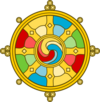Union Of The Sun And Moon
 From Handwiki
From Handwiki | Part of a series on |
| Tibetan Buddhism |
|---|
 |
The Union of the Sun and Moon (Tibetan: ཉི་ཟླ་ཁ་སྦྱོར, Wylie: nyi zla kha sbyor)[1] is one of the Seventeen tantras of the esoteric instruction cycle (Tibetan: མན་ངག་སྡེའི་རྒྱུད་བཅུ་བདུན, Wylie: man ngag sde'i rgyud bcu bdun) which are a suite of tantras known variously as: Nyingtik, Upadesha or Menngagde within Dzogchen discourse.
"This tantra shows which experience a person undergoes in the intermediate state, the bardo, after passing away. It teaches how to resolve one's master's oral instructions during the bardo of this life, how to stabilize awareness during the bardo of dying, how to attain enlightenment through recognizing awareness during the bardo of dharmata, and, if necessary, how to be assured a rebirth in a natural nirmanakaya realm during the bardo of becoming and there reveal buddhahood without further rebirths."[2]
English discourse

Namkha'i and Shane (1986, 1999: p. 91) open the discourse of the 'Song of the Vajra' (Wylie: rdo rje'i glu zhig)[3] an excerpt of the Union of the Sun and Moon into the English language and render it thus:
Unborn, yet continuing without interruption,
neither coming nor going, omnipresent,
Supreme Dharma,
unchangeable space, without definition,
spontaneously self-liberating--
perfectly unobstructed state--
manifest from the very beginning,
self-created, without location,
with nothing negative to reject,
and nothing positive to accept,
infinite expanse, penetrating everywhere,
immense, and without limits, without ties,
with nothing even to dissolve
or to be liberated from,
manifest beyond space and time,
existing from the beginning,
immense ying [Wylie: dbyings, inner space,
radiant through clarity
like the [S]un and the [M]oon,
self-perfected,
indestructible like a Vajra,
stable as a mountain,
pure as a lotus,
strong as a lion,
incomparable pleasure beyond all limits,
illumination, equanimity,
peak of the Dharma,
light of the [U]niverse,
perfect from the beginning.[4]
Primary resources
- Nyi ma dang zla ba kha sbyor ba chen po gsang ba'i rgyud (@ Wikisource in Wylie)
- ཉི་མ་དང་ཟླ་བ་ཁ་སྦྱོར་བ་ཆེན་པོ་གསང་བའི་རྒྱུད @ Wikisource (Tibetan Unicode)
- Union of the Sun and Moon (Wylie: nyi zla kha sbyor) @ Scribd in .doc format
- nyi zla kha sbyor @ TBRC as PDFs of Pecha
- First Chapter of Union of the Sun & Moon Tantra (with embedded 'Song of the Vajra' in pecha format, sourced from TBRC @ Scribd
Notes
- ↑ Source: Union of the Sun and Moon (Wylie: nyi zla kha sbyor) (accessed: Friday March 19, 2010)
- ↑ Source: [1] (accessed: Friday March 19, 2010)
- ↑ Source: [2] (accessed: Tuesday March 23, 2010)
- ↑ Namkhai Norbu (author, translator), John Shane (translator, editor) (1986, 1999). The crystal and the way of light: sutra, tantra and dzogchen. Snow Lion Publication. ISBN:1-55939-135-9, ISBN:978-1-55939-135-1 Source: [3] (accessed: Monday March 22, 2010), p.91
External links
- Rachel Pang (n.d.). 'Text Analysis of the Union of Sun and Moon Tantra (nyid zla kha sbyor rgyud)' from the Tibetan Renaissance Seminar
- Namkhai Norbu & John Shane (translators) (n.d.). The Union of the Solar and Lunar Tantra (an excerpt)
- Tantra on the Secret Union of Sun and Moon
Categories: [Buddhist texts] [Tibetan Buddhist practices]
↧ Download as ZWI file | Last modified: 05/09/2025 14:34:41 | 24 views
☰ Source: https://handwiki.org/wiki/Unsolved:Union_of_the_Sun_and_Moon | License: CC BY-SA 3.0

 KSF
KSF